36 Best Vegan Proteins To Crush Cravings & Feel Full
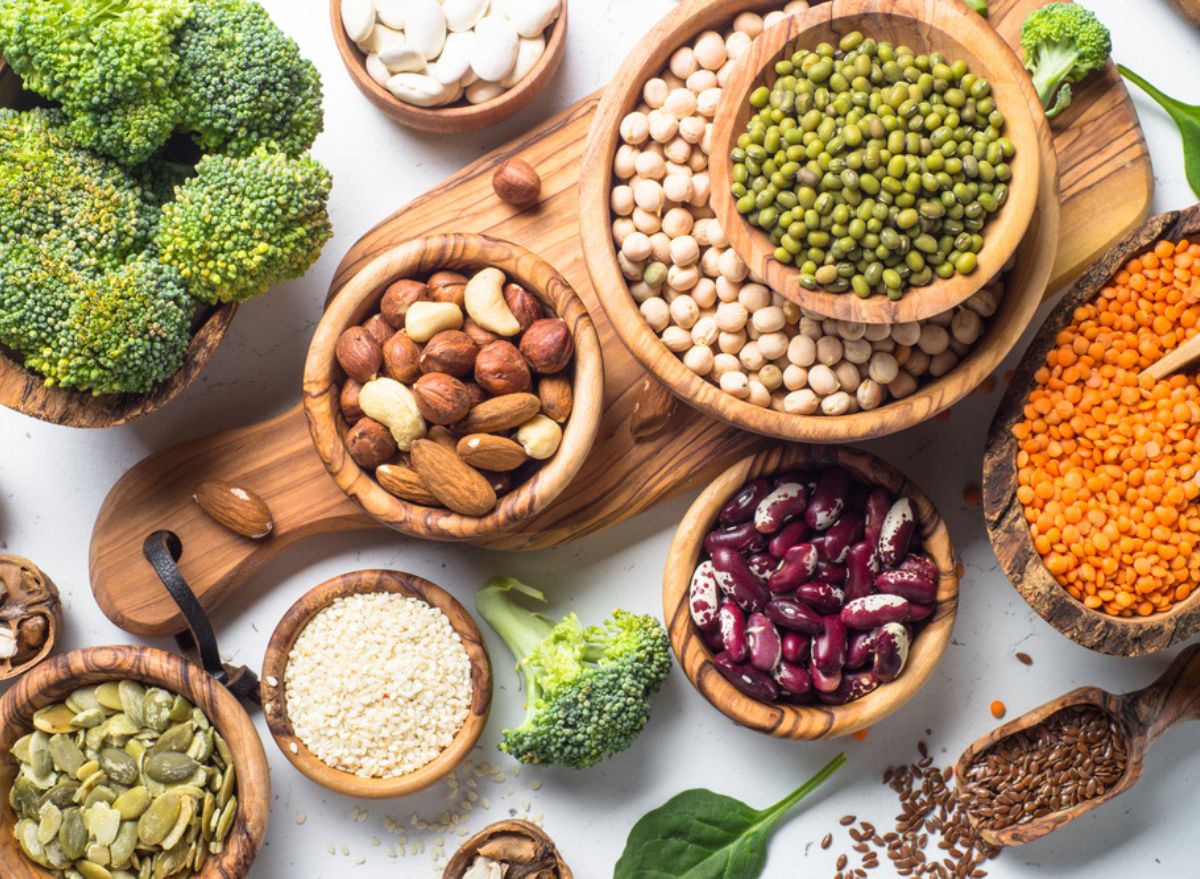
Getting enough protein in your diet is important for everyone. It helps you build and maintain muscle, it’s good for your bones, it can boost metabolism, and with its satiating properties, it can crush pesky cravings and help you feel more full. And while some of the most commonly discussed healthy protein sources are animal products like meat, eggs, and dairy, there are far more healthy vegan protein sources than most people realize.
Whether you eat a vegan or vegetarian diet or just want to consume fewer meat products in the new year, plant-based proteins are a great choice for meeting your nutrient needs. They are naturally lower in saturated fat and sodium than many meat products and often come with higher amounts of fiber.
One important thing to consider when choosing vegan proteins is that all protein sources are either “complete” or “incomplete” proteins. Complete proteins contain all nine essential amino acids that your body needs and incomplete proteins only contain some of the nine, and your diet should include a balance of both types. Most often, complete proteins are animal products, and incomplete ones are plant-based. However, there are a handful of vegan proteins that are considered complete—which we will detail in this article—so make sure you’re eating both types of proteins when on a plant-based diet.
The following list contains the best sources of vegan proteins, ranked by protein content per serving, starting with the least and ending with the highest amount. Read on to see some of your favorites and maybe even discover some new ones you want to try, and for some of our favorite plant-based grocery products, check out The 8 Healthiest Non-Dairy Milk Alternatives—and 3 To Avoid.
Flax seeds
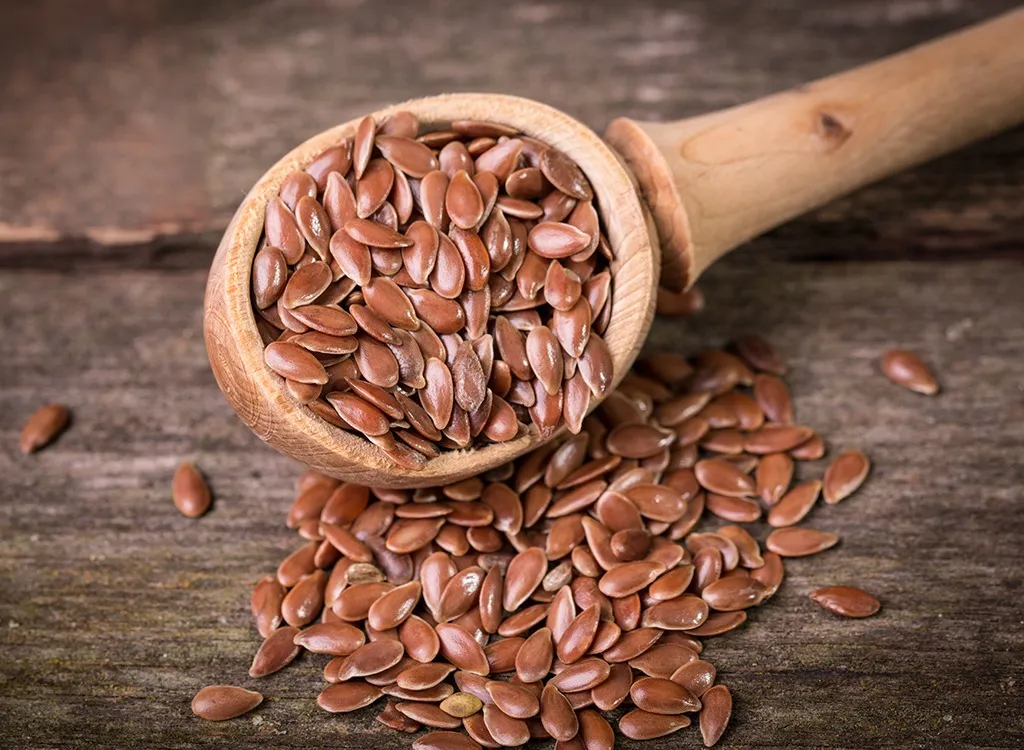
Typically sold as a supplement, flax seeds can take any smoothie or salad to the next level. By just adding a tablespoon of these seeds, you can get a little over a gram of protein. It may not seem like a lot, but every gram matters when making a protein-heavy vegan meal. In addition to providing protein, flax seeds add in healthy fat and extra fiber, which can keep you feeling full.
Brussels sprouts
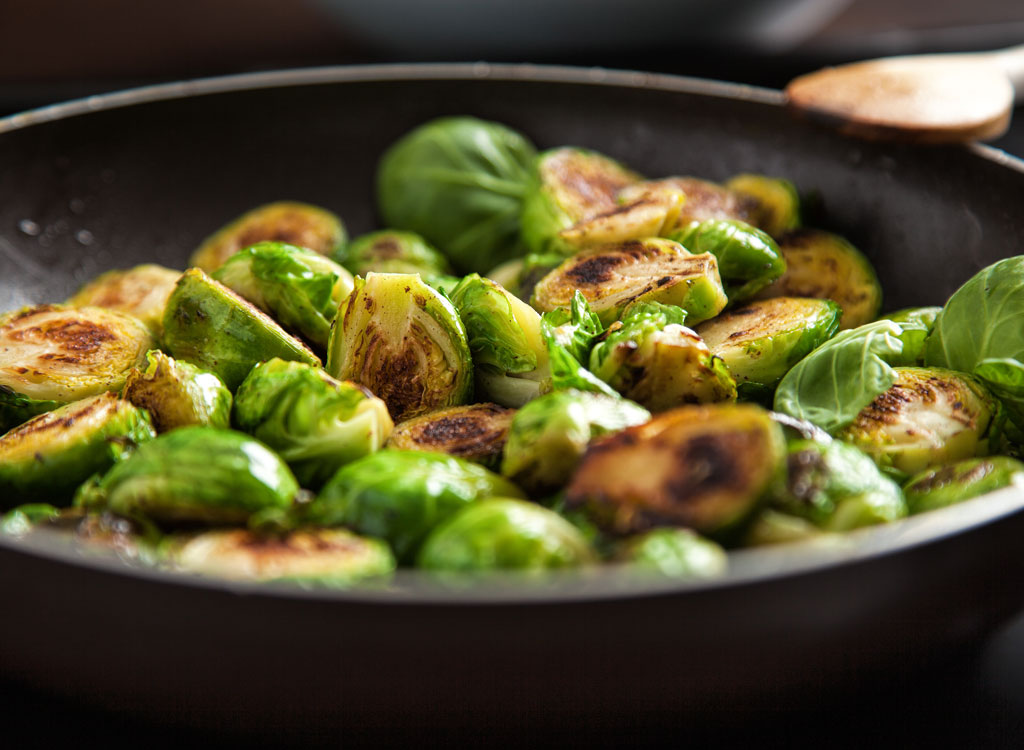
You may not have understood why you were forced to eat these as a kid, but in addition to high levels of iron and vitamin C, Brussels sprouts pack in a small amount of vegan protein.
You can roast, blanch, sautee, or prepare these however you like. With these vegetables falling into vogue again, it is easy to find recipes that fit any palette while providing solid nutrition to a meal.
Sweet potatoes

Sweet potatoes are a great vegan protein to have on hand. You can prepare these the same way you do as regular potatoes, and if you pair this potato with any other vegan protein source on this list, you can easily sneak in some extra protein to a meal. You can make a baked sweet potato with a side of quinoa and veggies, you can make a quinoa bowl and add in chopped sweet potato, or you can air fry some sweet potato fries and pair them with your favorite dipping sauce for a little indulgence.
Artichokes
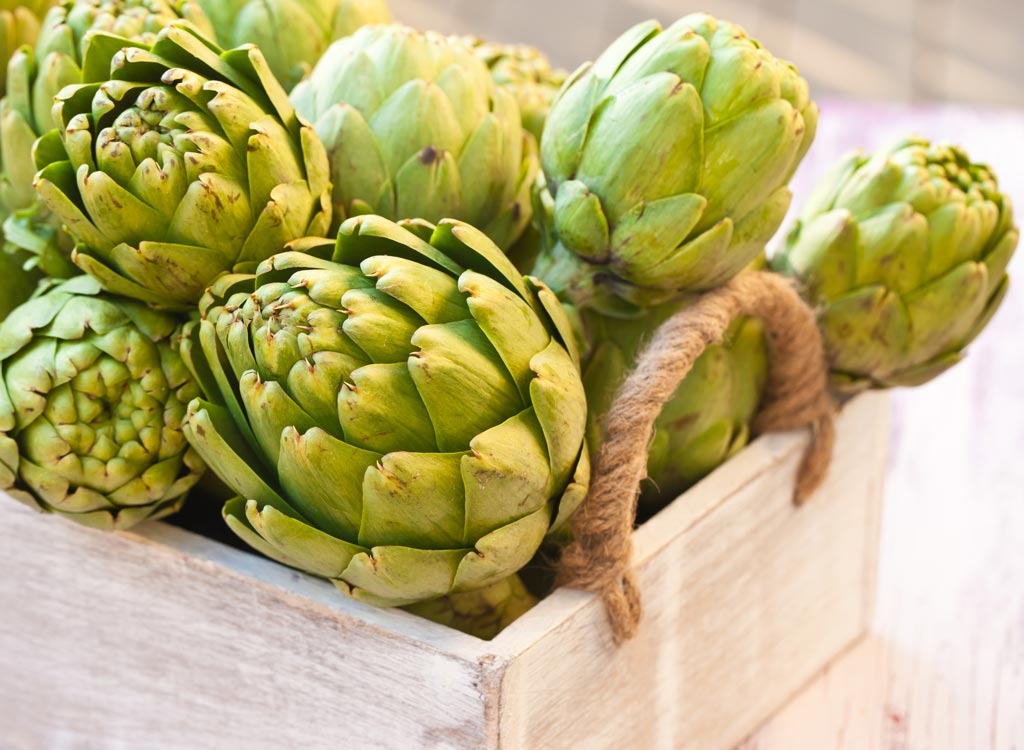
Out of all vegan protein sources, you probably would never guess that artichokes would make the list. With such a small amount of edible material on each vegetable, it might seem hard to get any protein at all. But have no fear. Maximize your gains from this vegetable by transforming it into a dip or sautéeing the artichoke hearts as a side dish.
Spinach
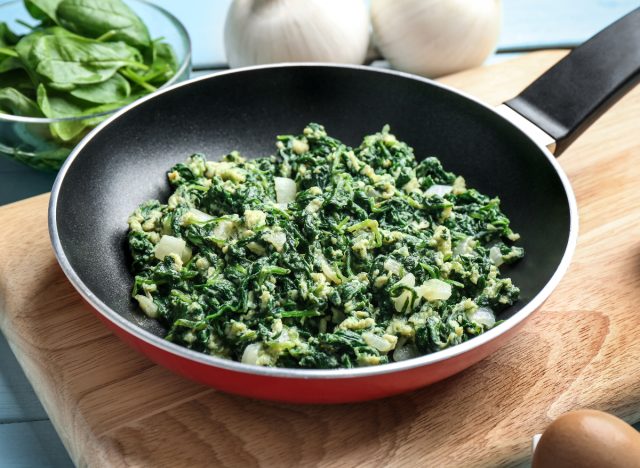
In addition to being an excellent iron source, spinach can help you build muscle mass by providing almost three grams of protein per a 1/2 cup cooked serving. By adding this leafy green to pasta dishes, casseroles, or stir-fry meals, you can maximize your nutrient intake on any plant-based diet.
Bulgur wheat
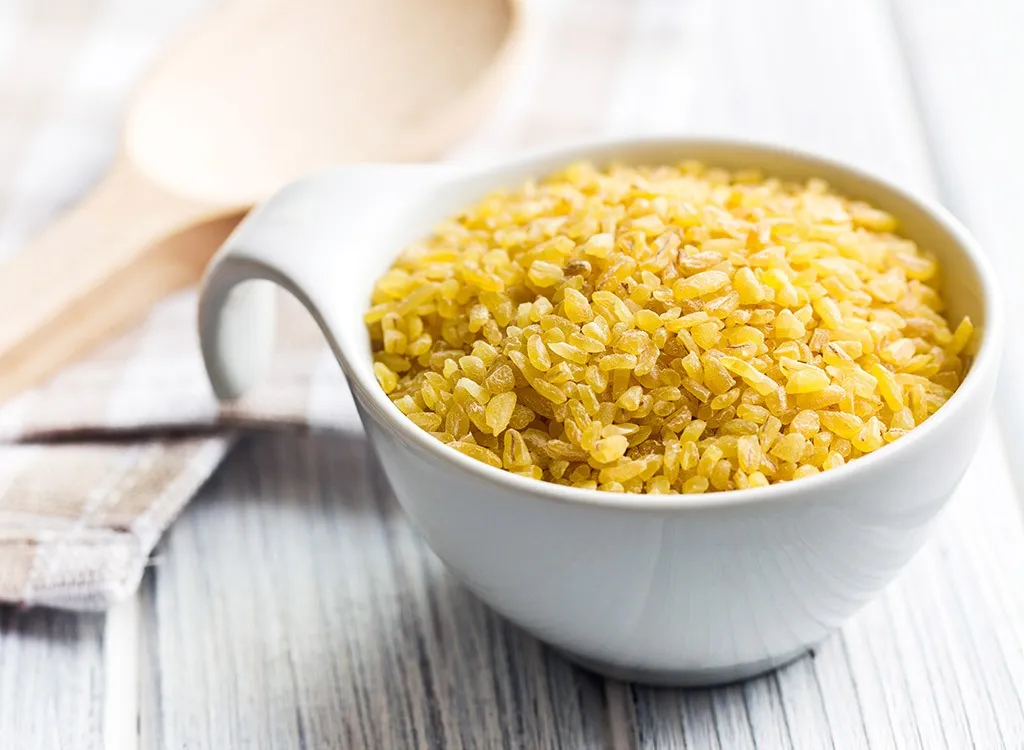
Bulgur wheat is a less popular grain, but it can supply a nice little boost of protein, iron, and fiber. When bulgur wheat is boiled, it has a polenta-like texture and a pleasant earthy taste. It can be eaten as a breakfast porridge to fill you up in the morning, a useful texture in homemade veggie burgers, or a simple side item in any dinner you prepare.
Wild rice
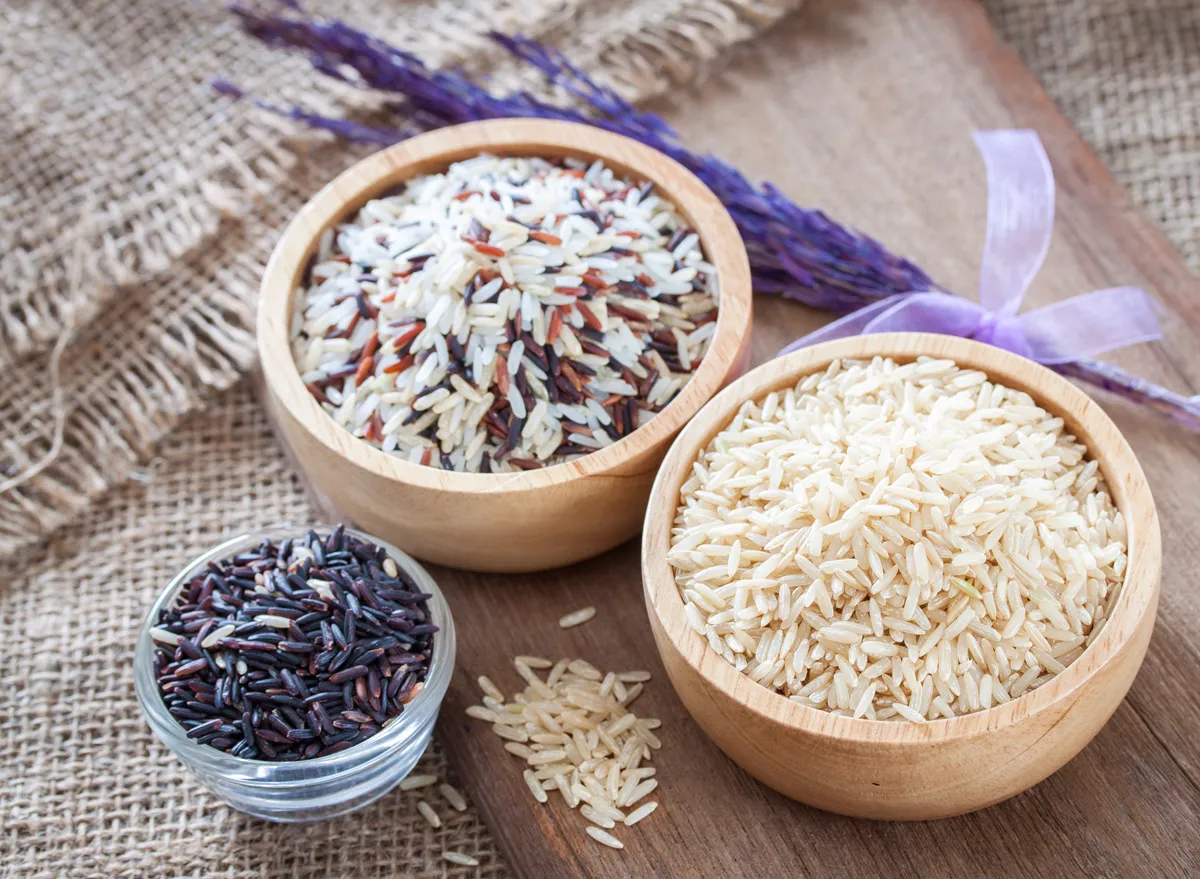
While it may be harder to find than the processed, white variety, wild rice is worth the added effort. With a 1/2 cup of cooked wild rice, you not only get 3.3 grams of protein, but you also get healthy servings of fiber, magnesium, and vitamin B-6 that you wouldn’t normally find in most processed white rice. Pair this with your favorite beans and vegetables for even more fiber and protein in your meal.
Oats
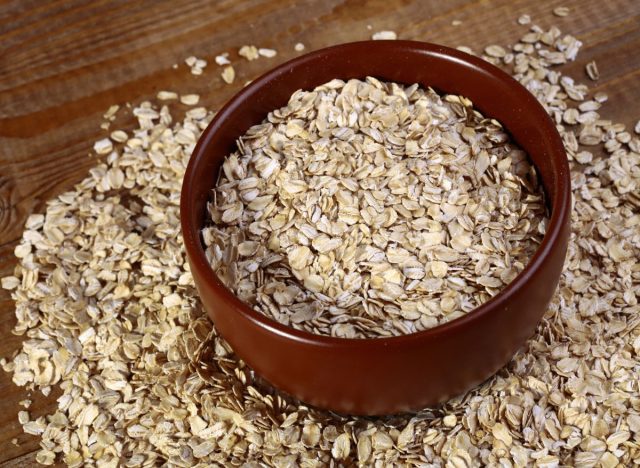
When you need a quick, hearty, and filling protein source, look no further than oats. In addition to cooking the oats to make a classic oatmeal breakfast—which you can top with other vegan proteins like flaxseed chia seeds, or peanut butter—you can also bake them into cookies to have a sweetly satisfying protein boost.
Spirulina

When it comes to vegan protein sources, spirulina is often overlooked. This seaweed has been a vital ingredient in dietary protein supplements for years, and now grocery stores have caught on. You can opt to cook it like kombu and make a soup stock out of it, crush it up, and sprinkle it on top of your meals to add umami, or you can buy it powdered and add it to your morning smoothie.
Spirulina also contains essential iodine, a nutrient you may lack if you pursue an all-plant diet.
Green peas
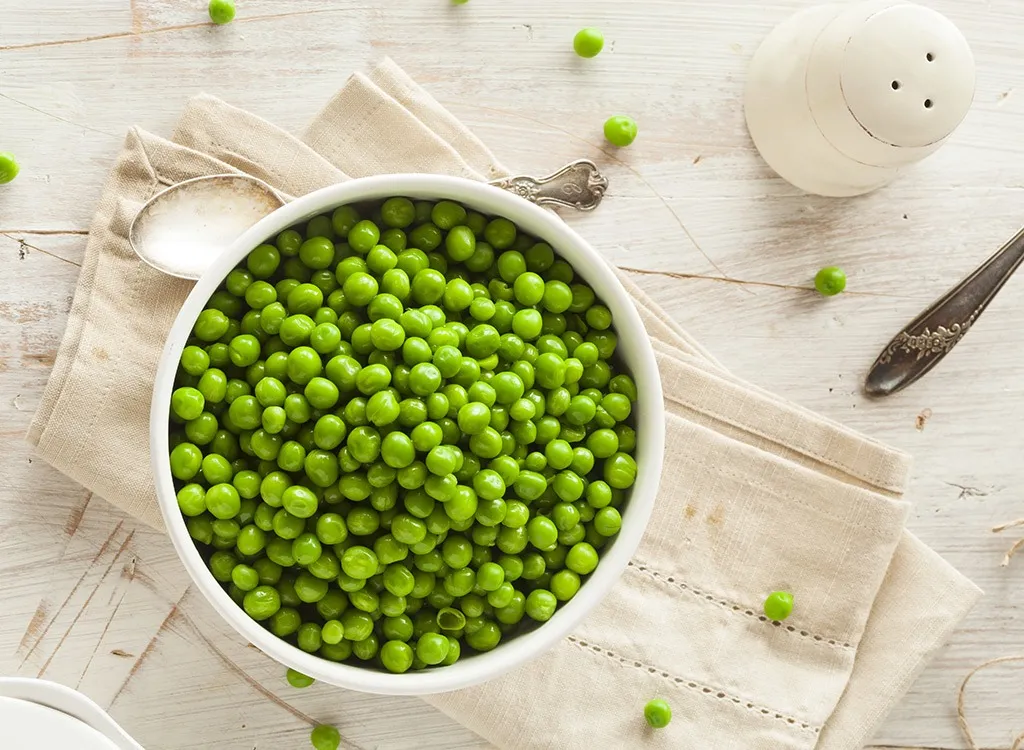
Green peas are one of the easiest side dishes to make if you need to up the protein levels in your meal. You can buy them frozen and keep them on hand for when you need a quick vegetable, and aside from having a few grams of protein, they also contain vitamins A and C, making them all the more appealing if you need some extra nutrition in your diet.
Potatoes
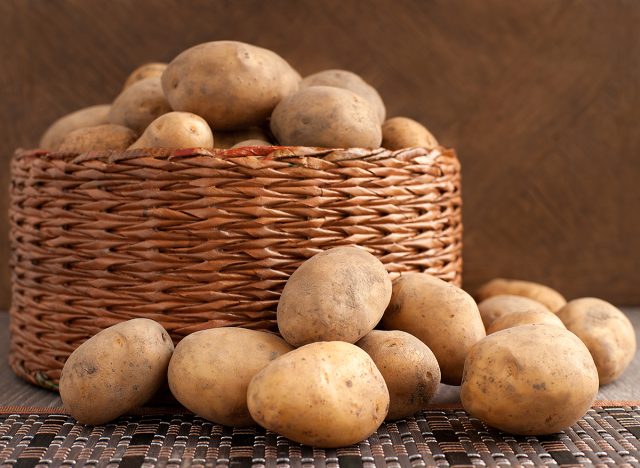
You may not have guessed it, but potatoes will supply you with a nice amount of protein to help keep you going each day. A small potato packs in at least three grams of protein and a medium one has around 4.5 grams. Potatoes also contain vitamins B6 and C, while supplying carbohydrates to keep you energized for your daily tasks.
Chia seeds
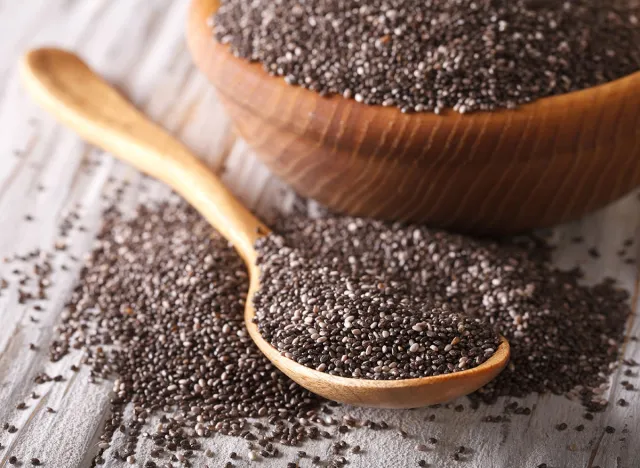
You may know chia seeds from the iconic chia pet statues, but these superfoods should not be discounted—they pack in protein, healthy fats, and magnesium. With a 1-ounce serving, you can get close to 5 grams of protein. It’s best to soak your chia seeds in some sort of liquid to let them soften and become easier to digest, but you only need to do that for a few minutes. Throw them into water, milk, or overnight oats to enjoy this nutritious vegan protein.
Teff
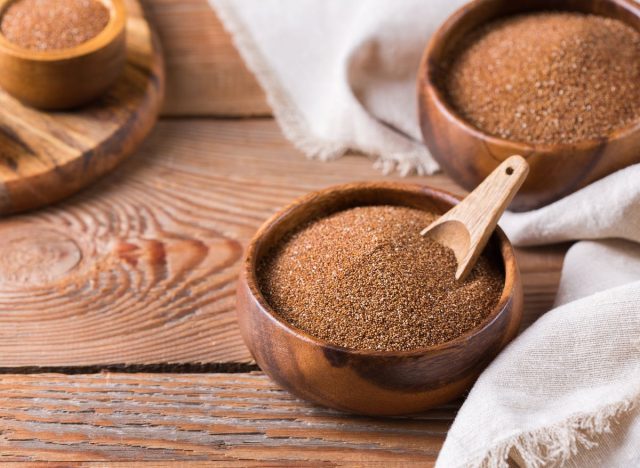
A traditional grain originating from Ethiopia and Eritrea, teff is a grass that you typically see in whole grain or powder form. With an earthy flavor, you can consume it like how you would eat wheatgrass and can even mix it with water to create a healthy drink. If you’re cooking the whole grain, you’ll need just a 1/2 cup serving to get almost 5 grams of protein.
Chickpeas
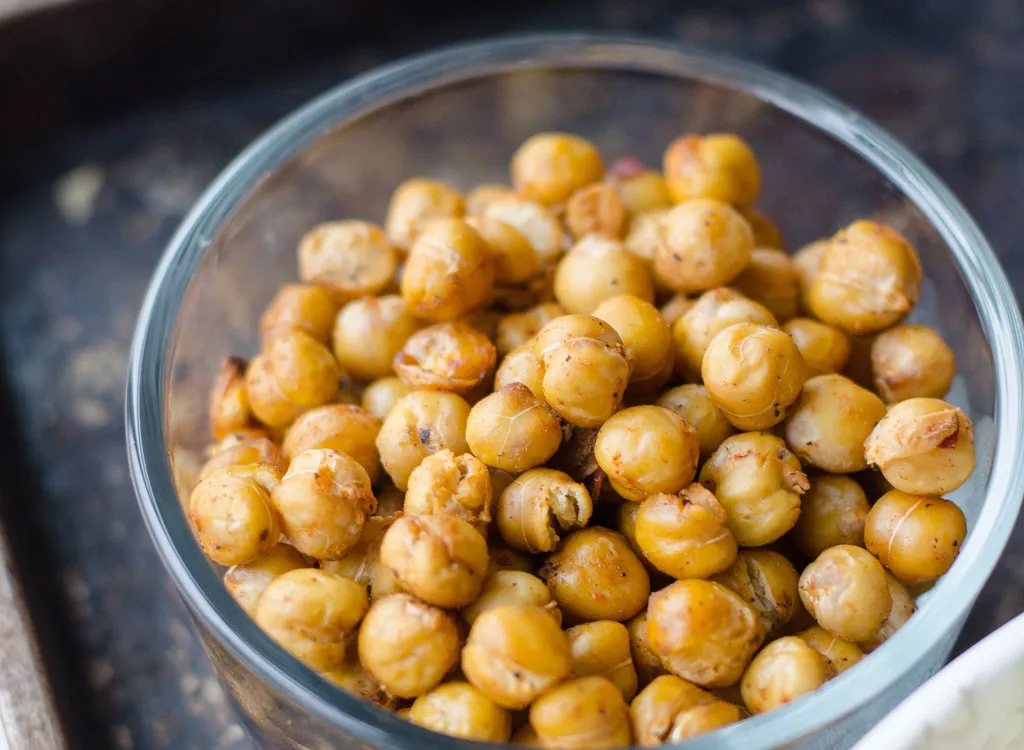
Found in a wealth of Middle Eastern recipes, the mighty chickpea will provide a handful of protein to keep you moving through your day. Whether you soak the dry beans or get the canned version, you get a bonus if you save the water they soak in. This water, called aquafaba, is a rich energy source that can replace egg whites in baking and has additional nutrients you can either add straight to your meal or save for later.
Nutritional yeast
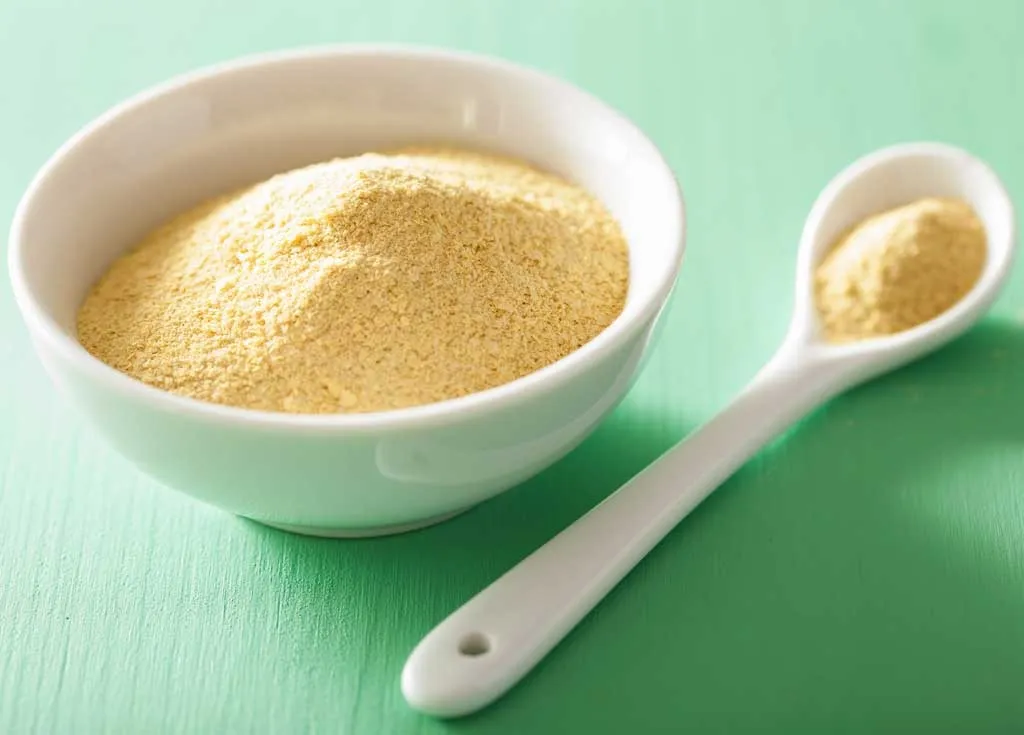
You may have seen this specialty vegan protein pop up at health food stores and local grocery stores alike. Known for being a cheese substitute for many plant-based recipes, nutritional yeast is “deactivated yeast” that can be sprinkled onto any meal to add an acidic bite, bringing out the flavors of your meal more than you could even expect. And what’s more, you only need about two tablespoons to get eight grams of protein.
Barley
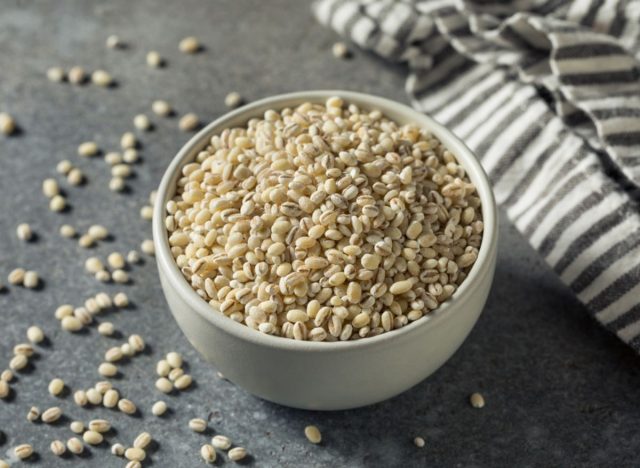
You may have seen the puffed version of this grain at bulk food stores and have maybe even eaten cereal or trail mix with added barley. What you might not know is that in addition to fiber, this vegan protein source contains a nice 5 grams of protein for every serving. You can boil the raw grain or throw the puffed version into salads to add a pleasant texture.
Spelt
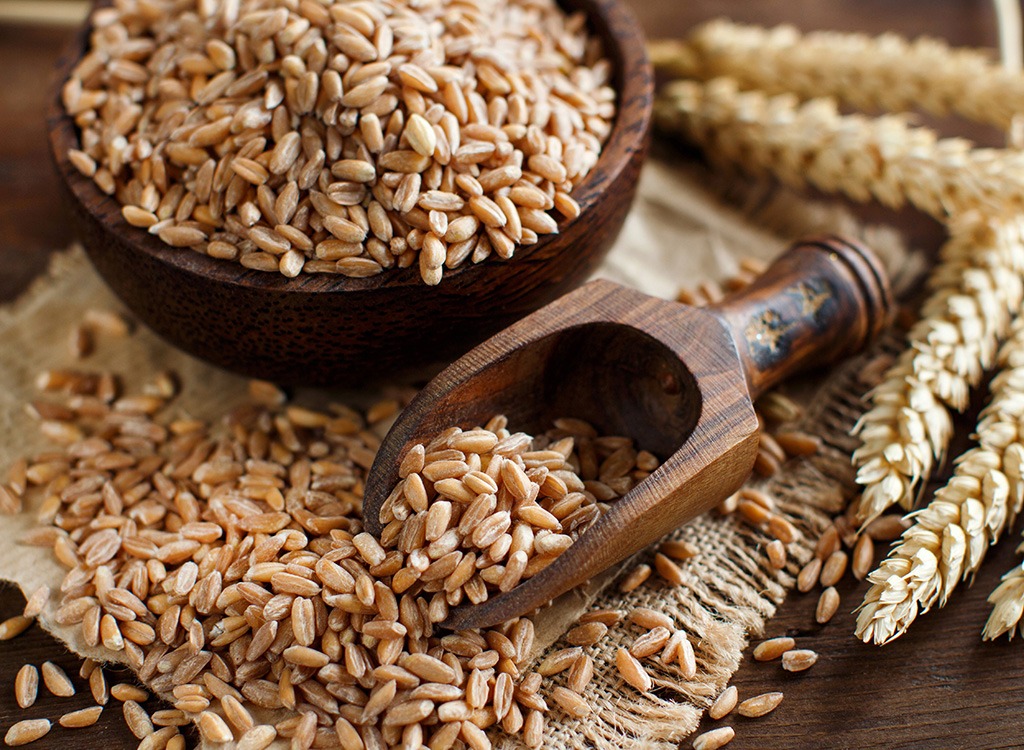
You may have never heard of this specialty grain, but the considerable plant-based protein content is a key reason why you may want to seek it out at your local health food store. Spelt can be cooked in the same process as couscous and packs in 5 grams of protein per 1/2 cup. You can boil and cook it like most other grains, or you can bake with the flour form, which also provides a nice protein boost.
Farro
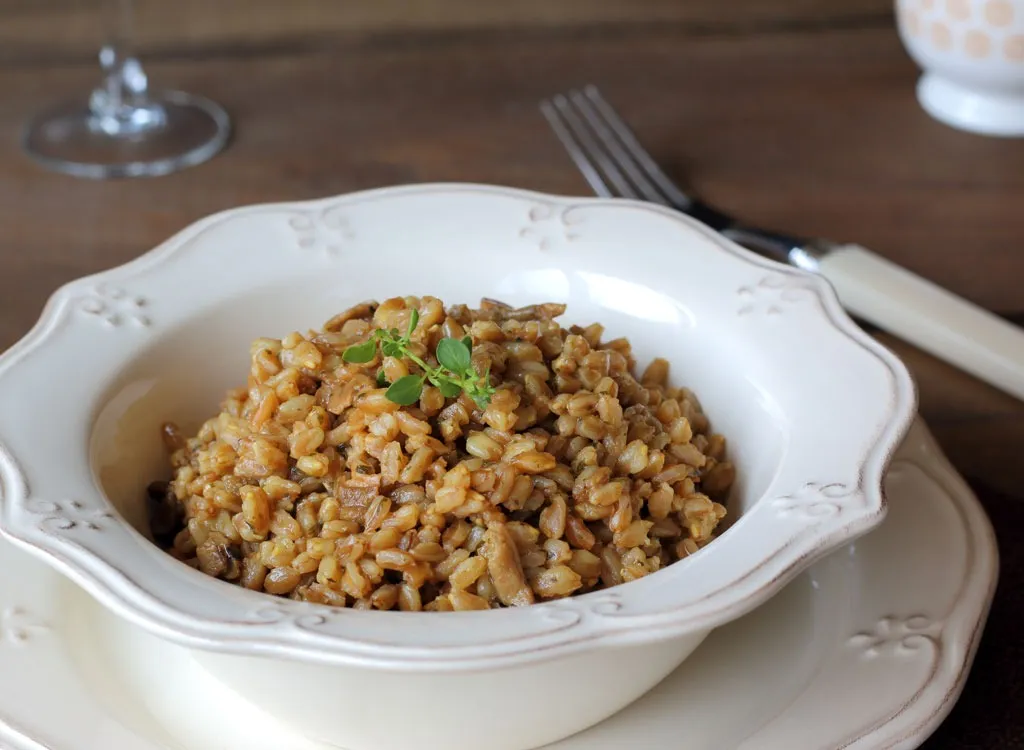
This grain mix appears commonly as an addition in salads and soups, but people often pass by it at the store because they aren’t sure what it is. Don’t be thrown off—this vegan source of protein adds extra depth and flavor to the meals it goes in or can be boiled and eaten plain. If you eat a serving of farro, you are sure to add at least 6 grams of protein to your diet.
Ezekiel bread
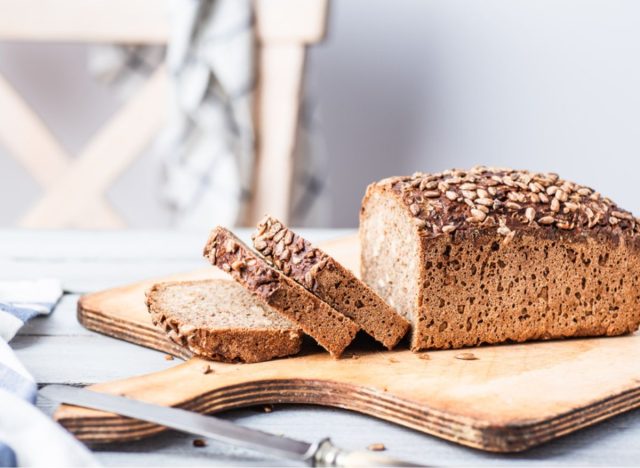
Ezekiel bread has gained traction fairly recently, but like many other vegan protein sources on this list, it has been eaten for generations. Made from sprouted grains, Ezekiel bread packs in 3 grams of protein per slice. That means that if you replace your regular choice of bread with Ezekiel bread when you make a sandwich, you can get an added 6 grams of protein.
Freekeh
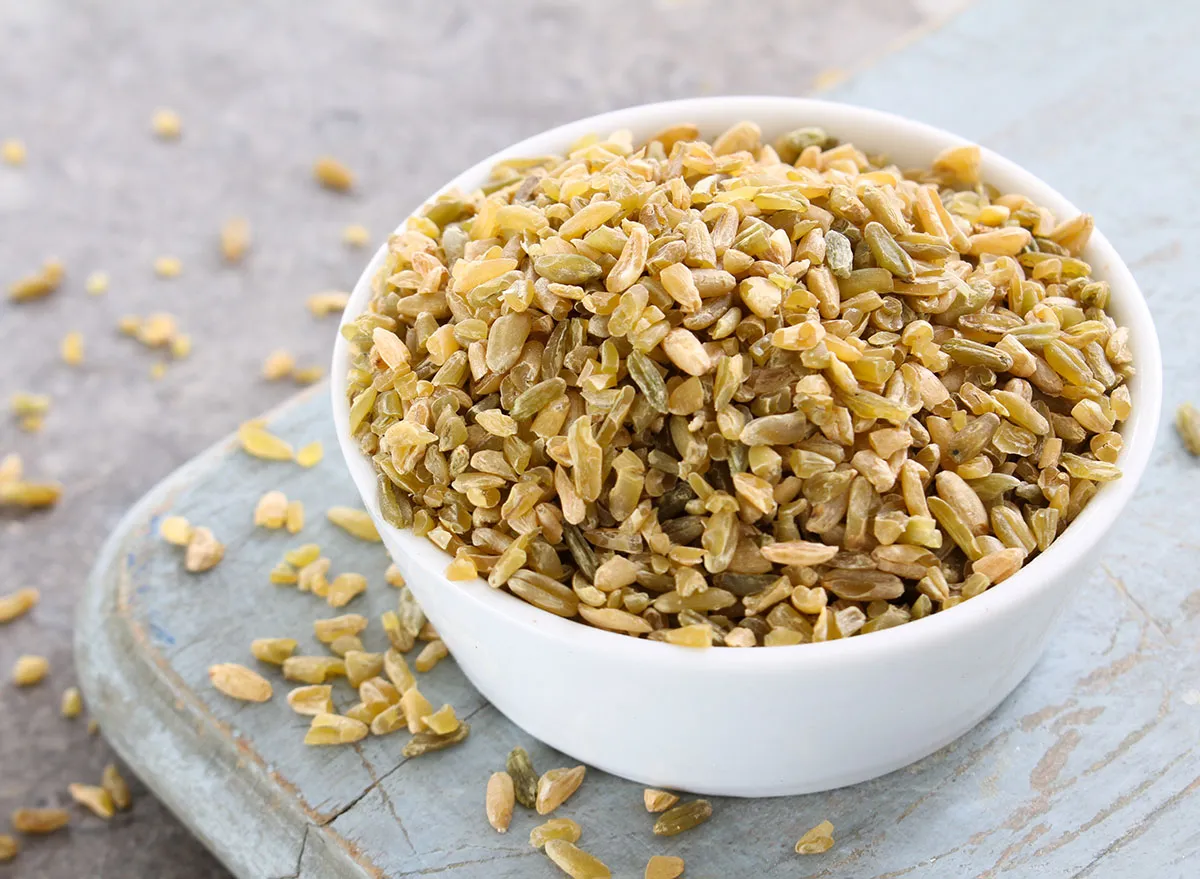
This Middle Eastern grain can be found in most grocery stores and packs in both flavor and protein. You just need a 1/4 cup serving to get 6 grams of protein and 7 grams of gut-healthy fiber.
Soy milk
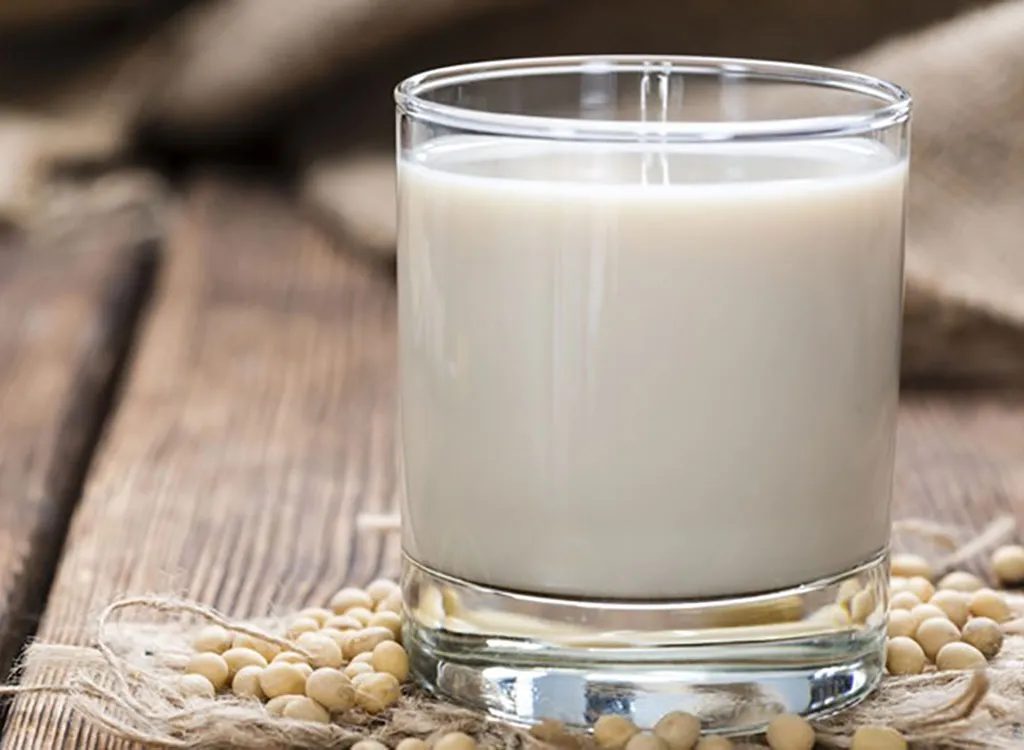
You’ve seen it in the refrigerator section for years, but you may not have realized that this beverage is a great vegan source of protein. With the same building blocks as tofu or tempeh, soy milk is made from pressed soybeans and chilled to perfection. If you get the unsweetened variety, you can cut out any unnecessary sugar, while getting a healthy dose of protein and vitamins A and B.
Pumpkin seeds
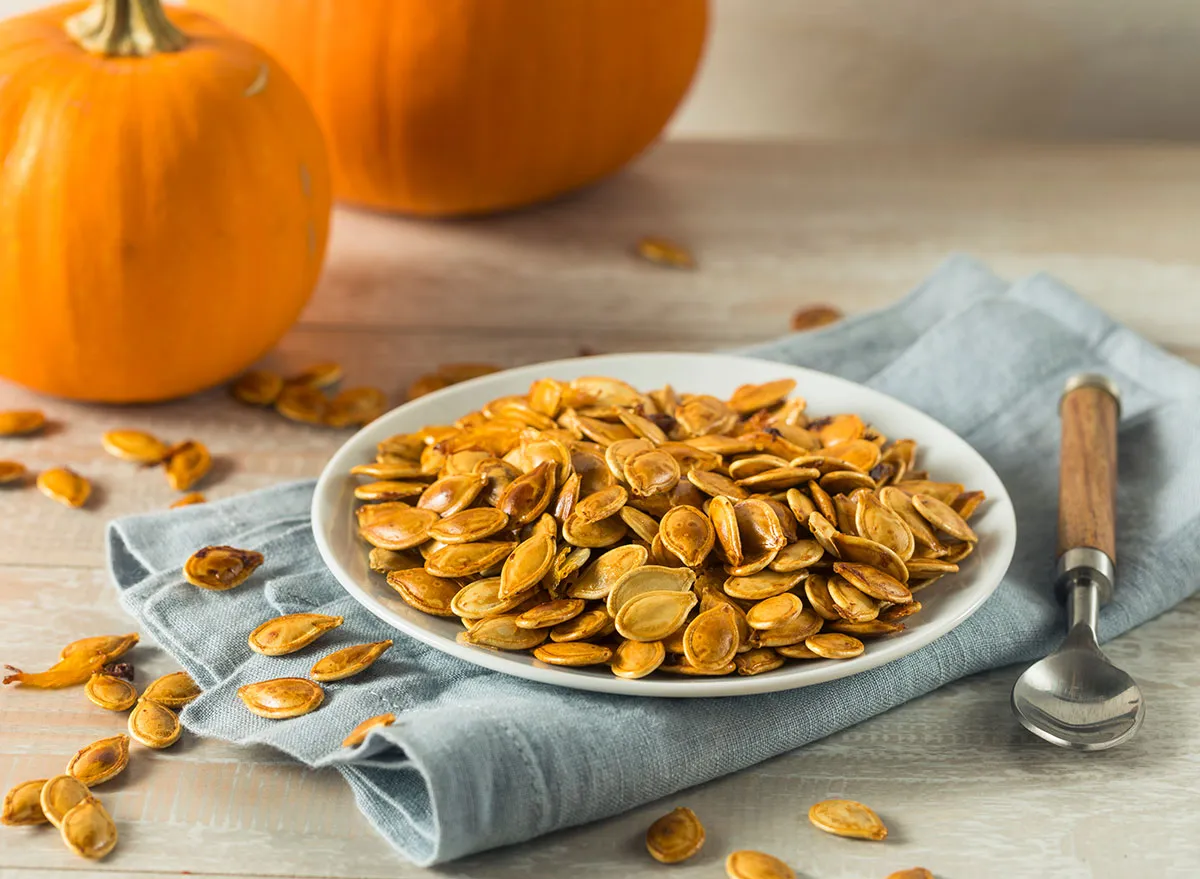
Whether it is Halloween and you are wondering what to do with your pumpkin scoopings or you are looking for an alternative vegan protein source any time of year, pumpkin seeds will provide you with almost 7 grams of protein per serving. You can collect them yourself and roast them in the oven, or buy them in bulk to make your own nut and seed mix. Either way, this vegan protein source will help you bulk up.
Wheat berries
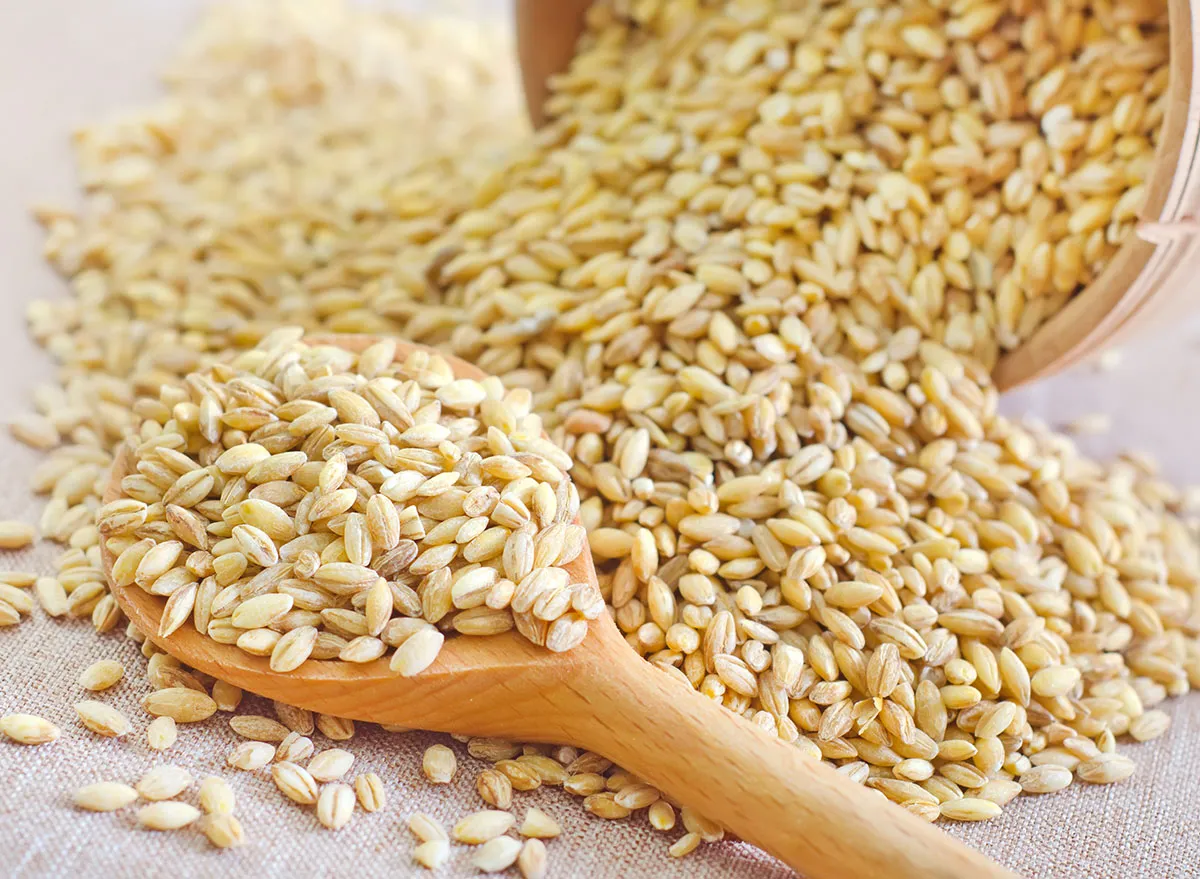
A wheat berry is a whole, unhusked wheat kernel, making it a perfect grain if you need fiber and protein in your day. Boil these like porridge to soften them down and flavor them any way you like to bolster the taste. At 7 grams of protein per 1/4 cup, you are guaranteed to feel wholesome and full after combining these with some of your other favorite vegan proteins like tofu, sweet potato, or black beans.
Black beans
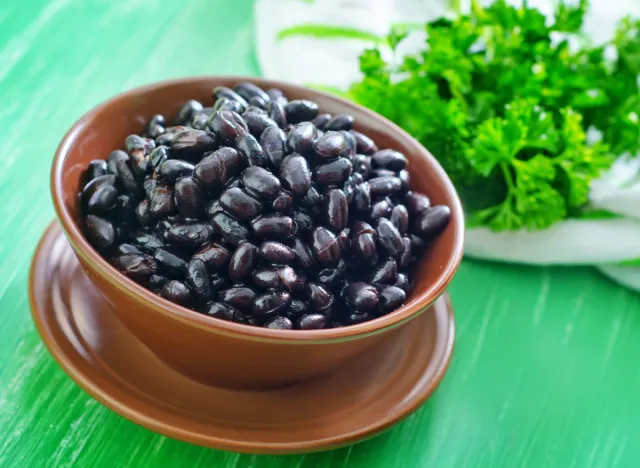
Black beans provide a delicious, versatile, fiber-rich protein, and you need just half a cup to get 7 grams of protein. They are an extremely versatile vegan protein—you can mash and fry them to create fritters, boil them with onions and garlic to create a Cuban-influenced side dish, add them as a base for veggie burgers, throw them into some sweet potato tacos, and much, much more.
Peanut butter
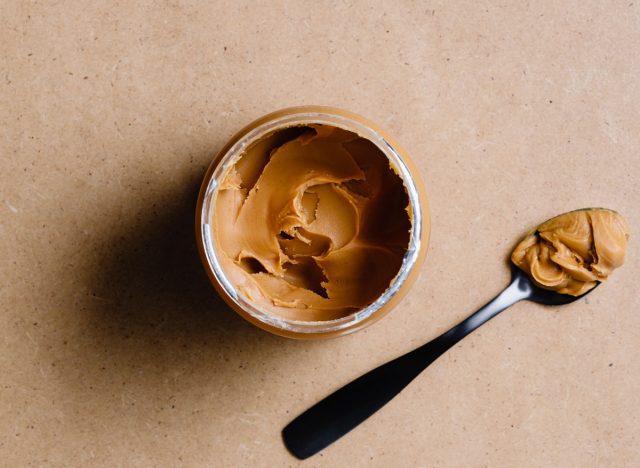
A vegan protein list wouldn’t be complete without peanut butter, a classic spread that even your parents knew to be a solid protein source. If you spread about two tablespoons of peanut butter on toast, you get almost eight grams of protein—and if you spread it on Ezekiel toast, you’ll get nearly 11 grams of protein total.
Don’t limit yourself to just making sandwiches with peanut butter though. Throw the spread on top of your favorite vegan ice cream, mix it into your oatmeal, or add it to noodle dishes to get both a flavor and protein boost.
Quinoa
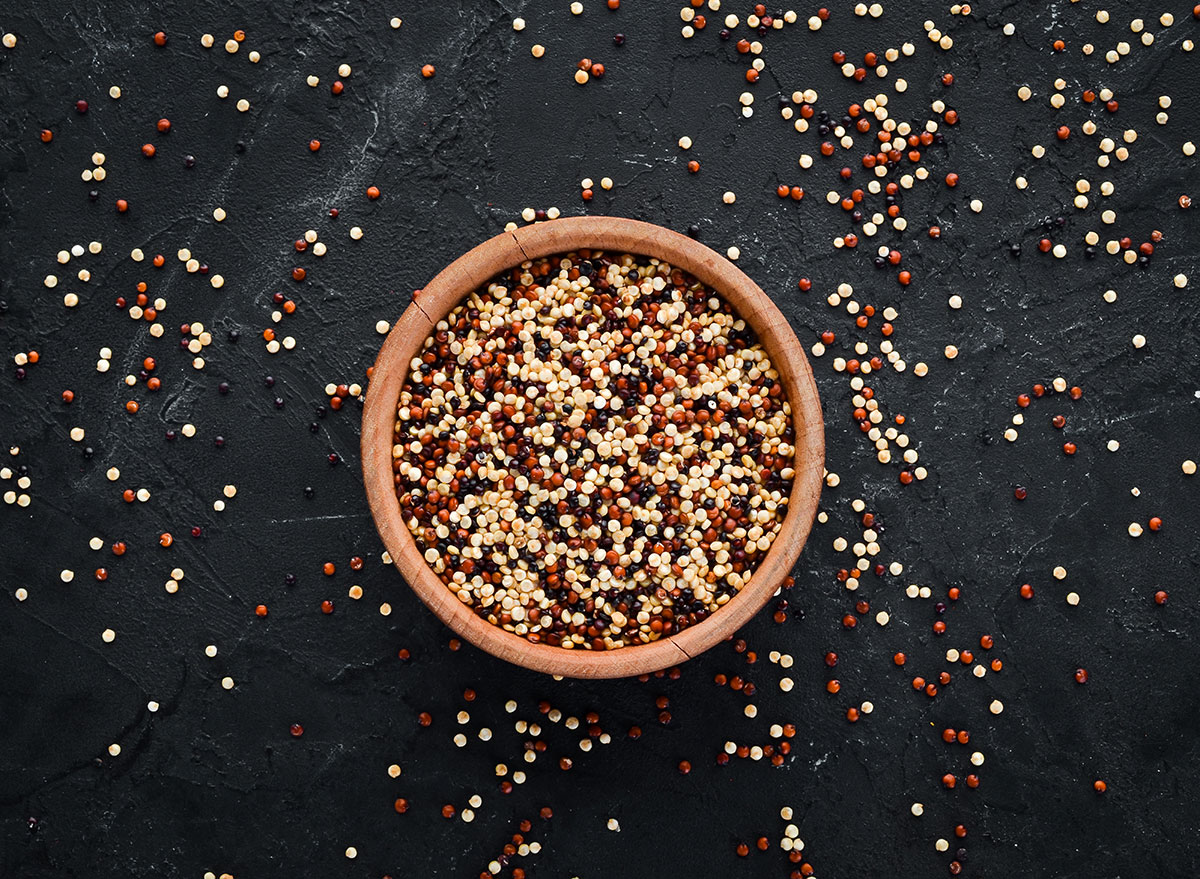
This trendy grain is a fantastic vegan protein source. Not only does Quinoa provide 8 grams of protein per serving, but it’s also one of the few plant-based complete protein sources, meaning it contains all nine essential amino acids. This grain is a fantastic rice replacement and can be a base grain for a variety of different dishes.
Textured vegetable protein
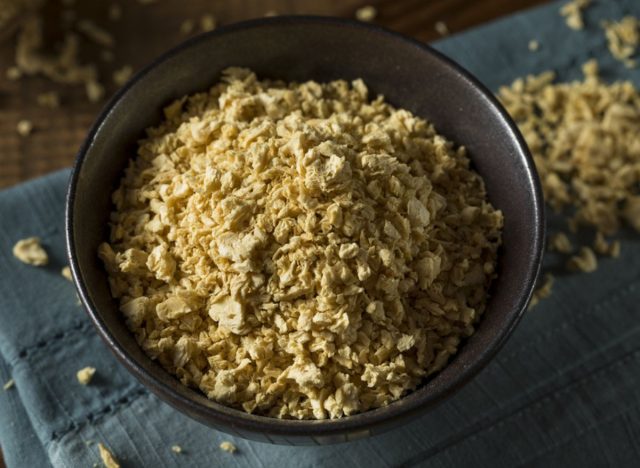
This is a lesser-known one as well, but textured vegetable protein will supercharge any meal you can add it to and pack in almost 9 grams per 1/4 cup serving. It’s often seen as a vegan substitute for ground beef, and you can find this product in the freezer section or on the shelf next to some of the supplements and health foods at your local supermarket.
Edamame
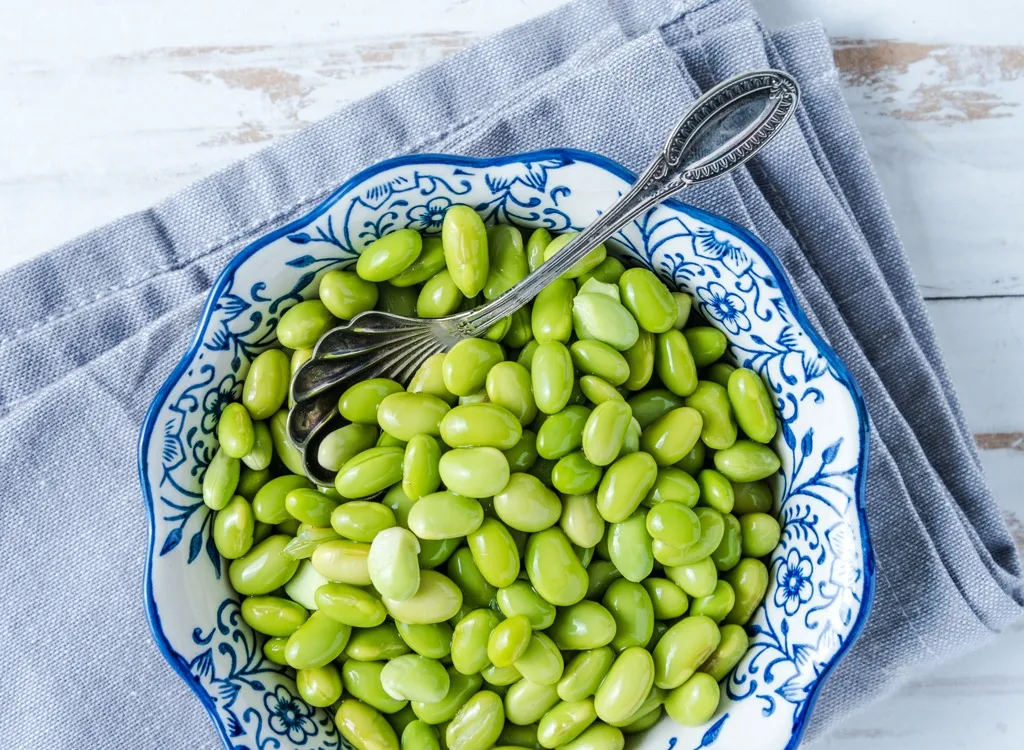
“Edamame, the young soybeans harvested before reaching full maturity, is an excellent vegan protein source, prized for its high protein content and nutritional richness,” says Mary Sabat MS, RDN, LD. “Edamame not only provides a substantial amount of plant-based protein but is also considered a complete protein, containing all the essential amino acids necessary for protein synthesis in the body.”
In addition, this protein offers “essential nutrients such as fiber, vitamins, and minerals,” adds Sabat.
Lentils
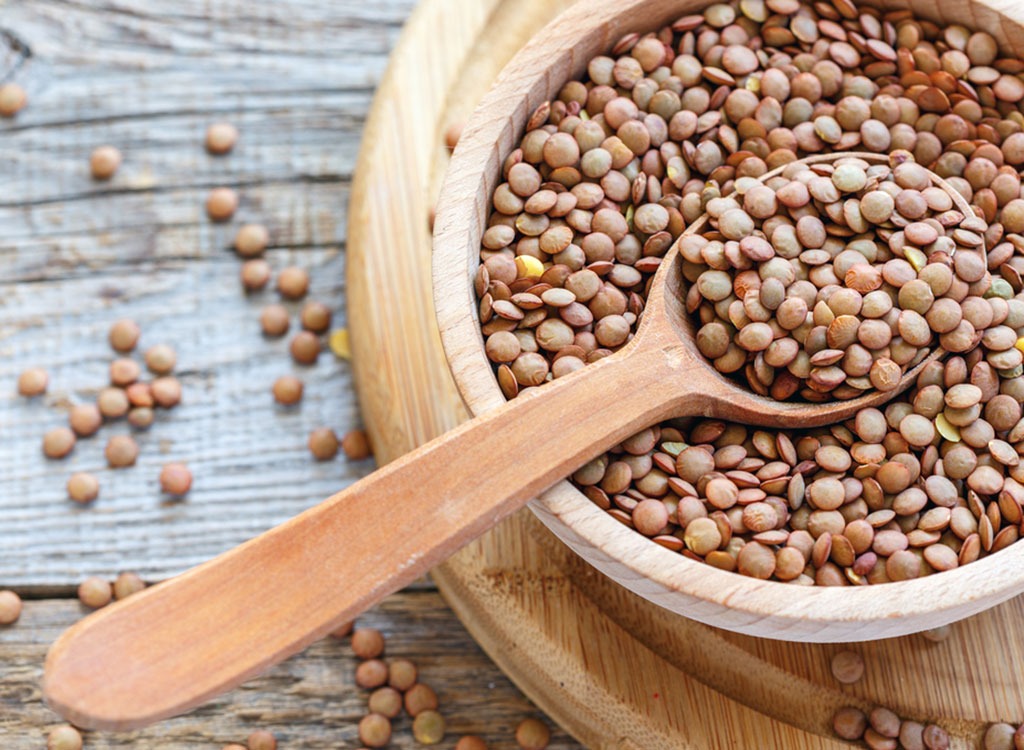
This staple vegan protein source has easily earned its spot on our list. You just need a 1/2 cup of cooked lentils to get a solid nine grams of protein, and they are extremely versatile and add a nice nuttiness to any meal.
“They are not only protein-rich but are also high in fiber, vitamins, minerals, and antioxidants,” says Sabat, “and lentils come in various types, offering versatility in taste and texture, from earthy and nutty flavors to a range of textures, including soft, mushy red lentils ideal for soups and stews, and firmer brown or green lentils suitable for salads and side dishes.”
Tofu
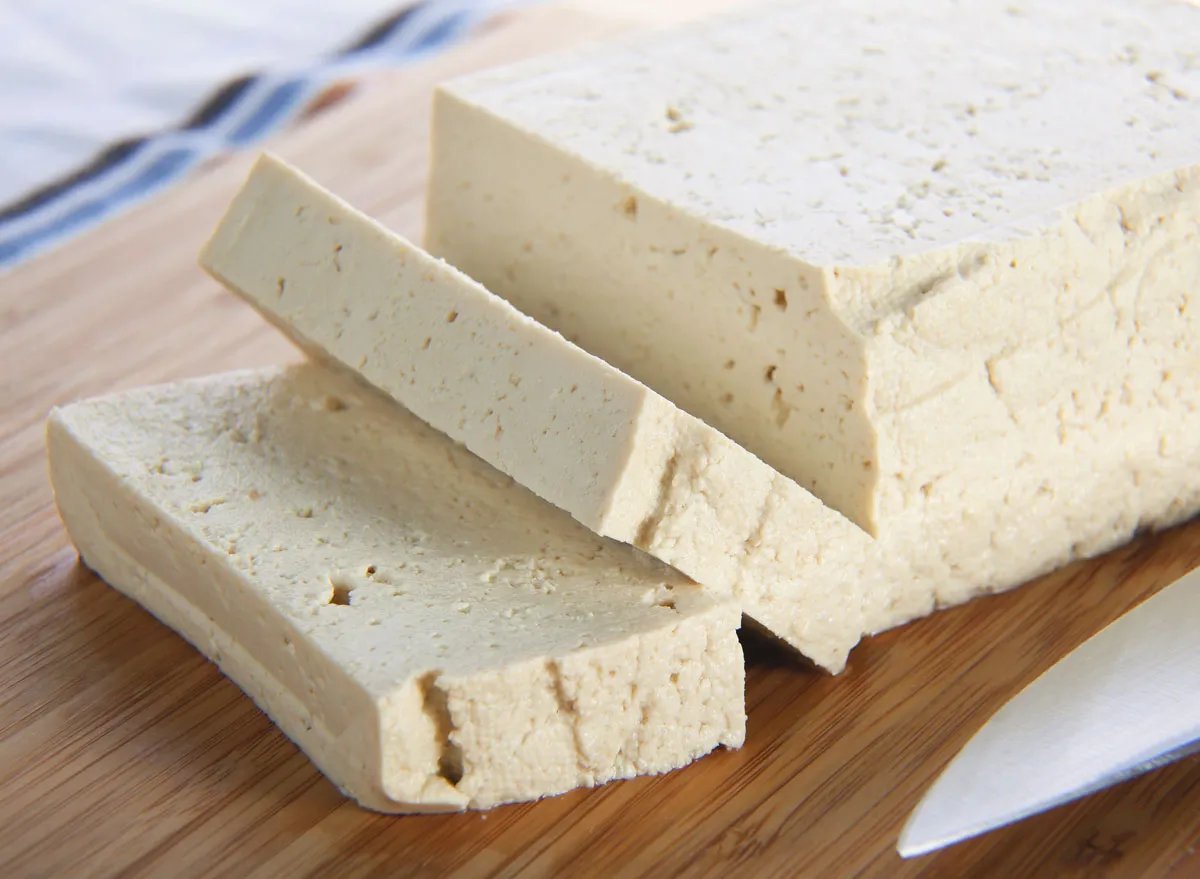
Tofu has established itself as one of the best soy-based vegan proteins—most supermarkets carry it, it can be cooked in a variety of ways, you can flavor it to fit any dish, and can cook it to your texture preference, ranging from soft to crispy.
Sabat loves tofu as a plant protein, saying it is “an exceptional source of protein, offering completeness as a protein by containing all essential amino acids needed for bodily functions, and its versatility in the kitchen is a standout feature, as tofu’s neutral flavor allows it to be used in various culinary applications, from savory dishes like stir-fries and soups to sweet creations like desserts and smoothies.”
Hemp hearts
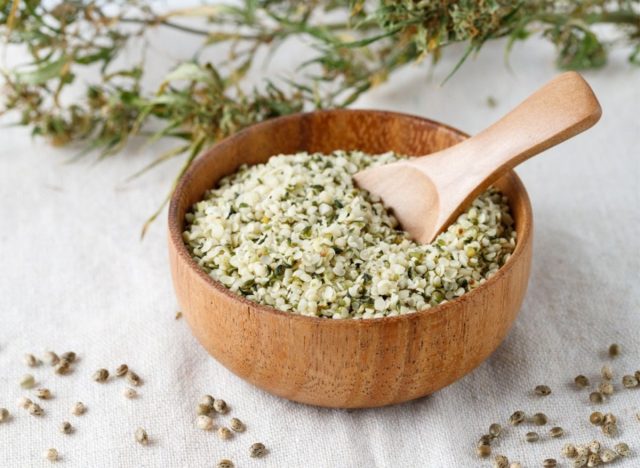
Hemp hearts are known to be packed not just with protein, but healthy fats as well, which can help enhance any dish, such as salads, baked goods, oatmeal, smoothies, etc.
Hemp hearts are the soft insides of hemp seeds, which you can purchase instead if you’re looking for a crunchier vegan protein.
Amaranth
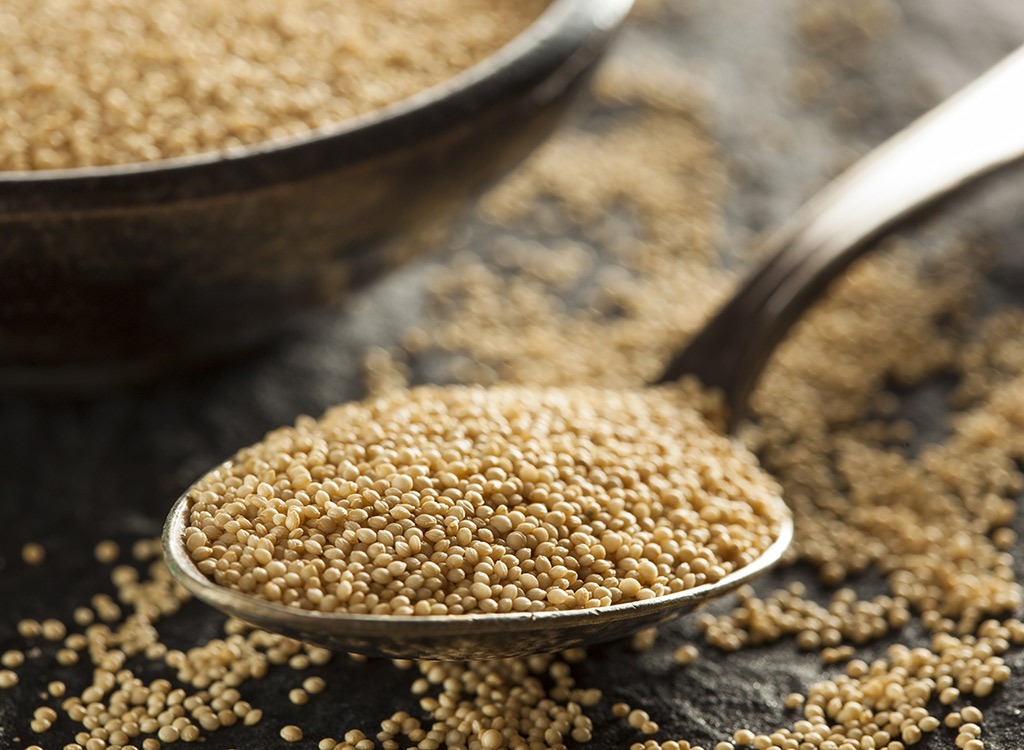
This starchy cereal has been gaining popularity, and like many other grains, amaranth has been known to be an essential source of protein, magnesium, and iron. This grain can replace rice or potatoes as a side starch in many meals with a considerable boost in nutrients. You can often find it in bulk stores in its unprocessed form, meaning you get the hull of the cereal with extra fiber.
Khorasan wheat
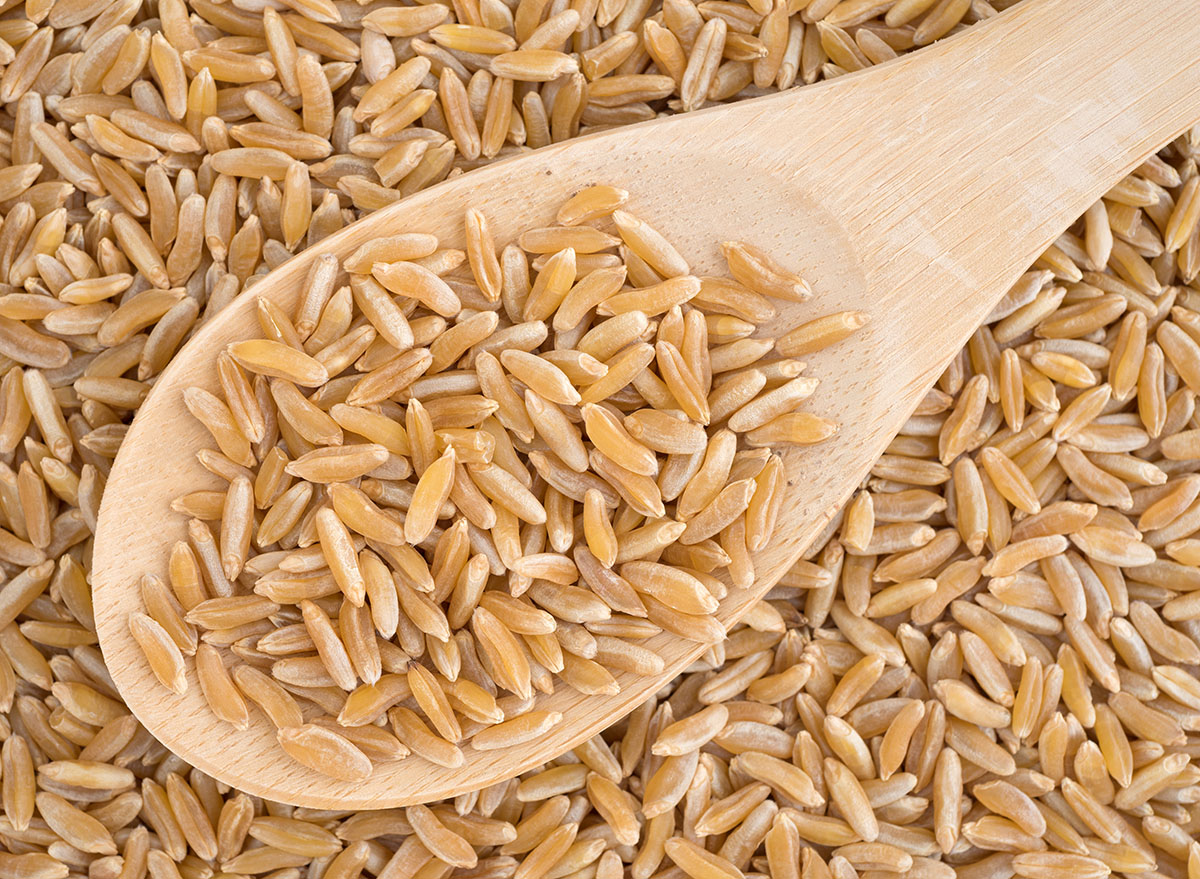
This ancient grain packs in the vegan protein—eat one cup of this wheat and you get almost 10 grams of protein. This is great to consume as a breakfast porridge and top it off with some spinach to have an excellent start to your day.
Tempeh
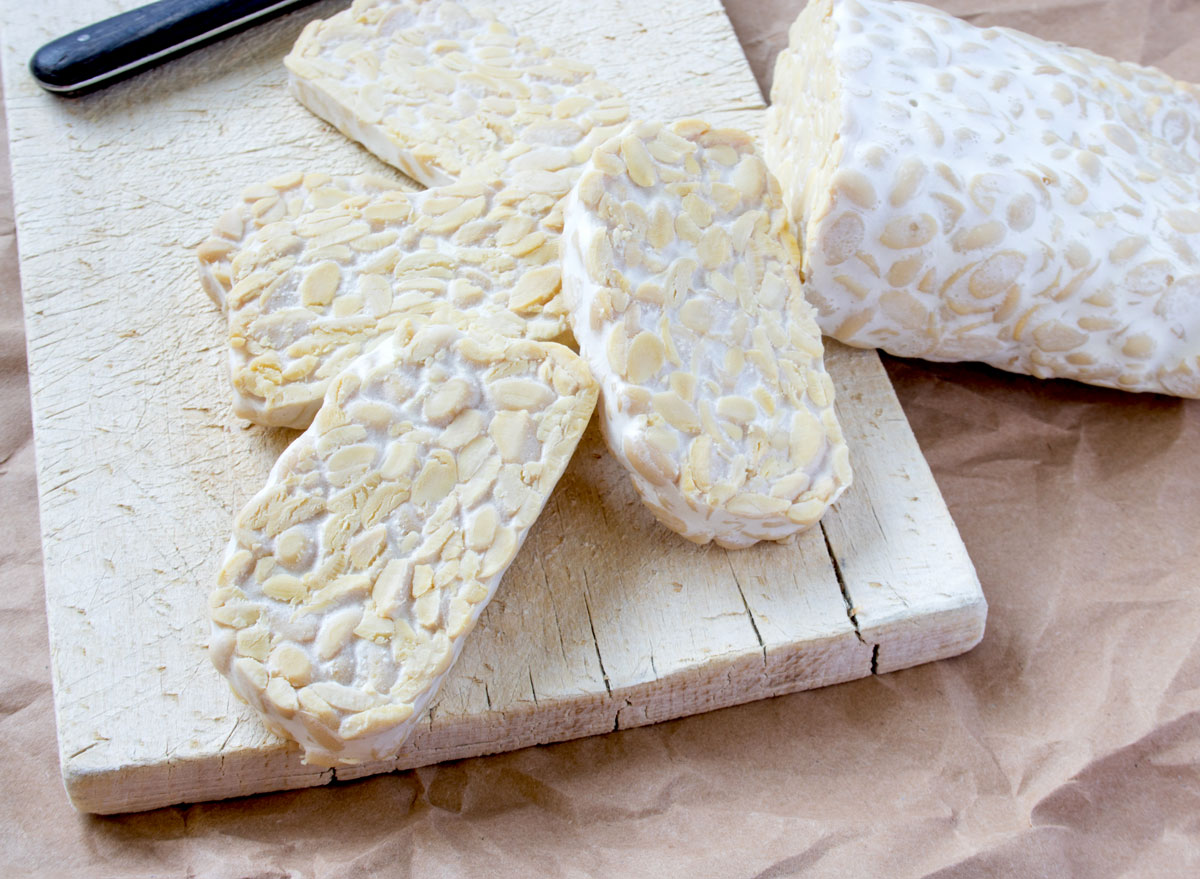
This fermented soybean-based protein source found its way from Indonesia to America and contains enough nutrients to keep you going.
“As a complete protein, it supplies all the essential amino acids crucial for protein synthesis, promoting muscle growth and overall health in plant-based diets,” says Sabat, “and tempeh’s fermentation process enhances its nutritional profile, increasing the bioavailability of nutrients and making it easier for the body to digest.”
Sabat also adds “To align with health-conscious and environmentally conscious choices, it is advisable to opt for organic or non-GMO tempeh, ensuring that it’s made from non-genetically modified soybeans and upholding the quality and purity of this exceptional plant-based protein source.”
Buckwheat
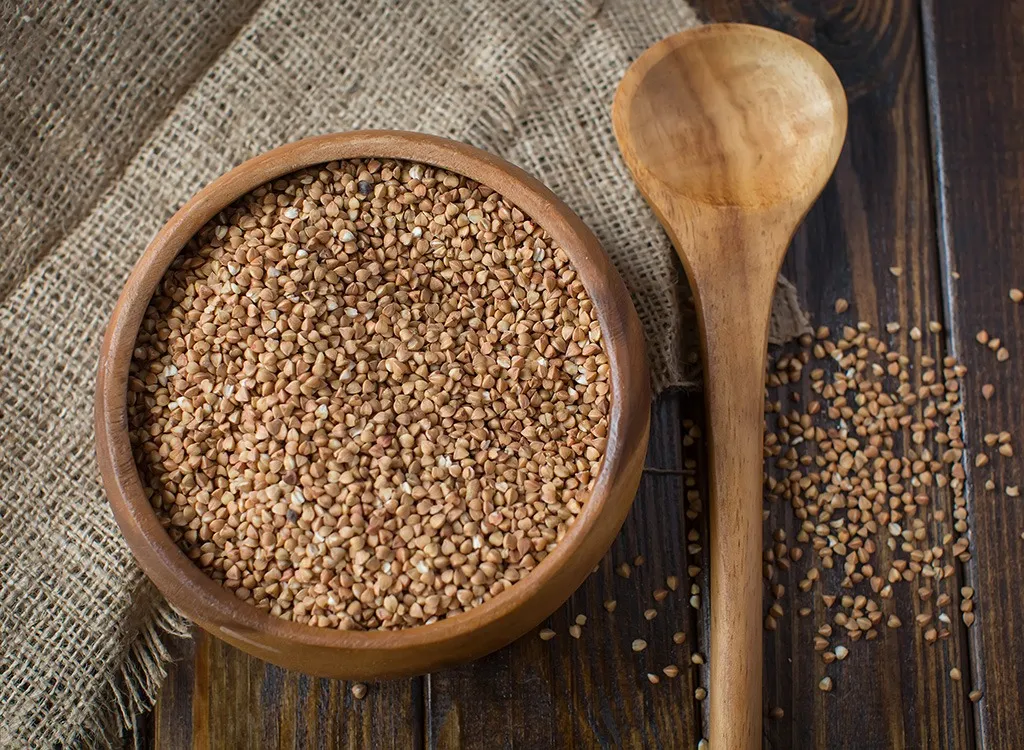
This high-protein vegan wheat appears throughout the world, and you may have already had the Eastern European dish Kasha, which is made out of this whole grain. This fantastic grain not only contains more than 11 grams of protein per a 1/2 cup, but you also get iron and a boost of fiber in each serving.
You can prepare this as a porridge, replace an ordinary side starch with it, or pair it with vegetables to make an excellent pilaf that will impress anyone you serve it to.
Seitan
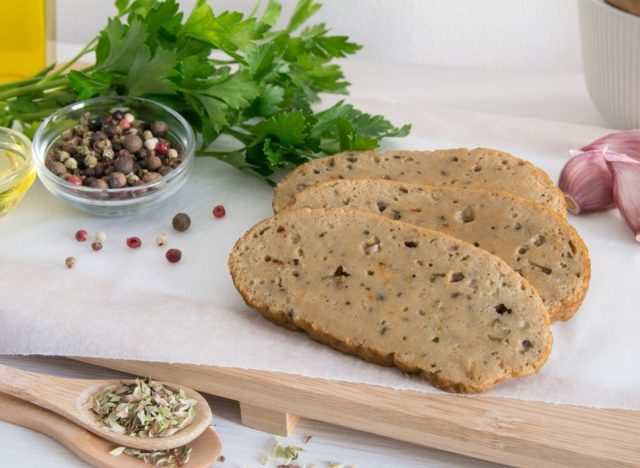
This trendy vegan protein source has broken through to the mainstream in recent years and has made appearances on restaurant menus across the country. Made from vital wheat gluten, this protein source is a great meat substitute and can be marinated and prepared most ways you would prepare chicken or pork.
“Its meat-like texture and ability to absorb flavors make it a versatile ingredient in various dishes, and while it is not suitable for those with gluten sensitivities or celiac disease, its inclusion in a well-balanced vegan diet, alongside complementary protein sources like legumes, tofu, and grains, can help ensure a balanced amino acid profile,” says Sabat. “Despite not being a complete protein on its own, seitan’s nutritional benefits and culinary versatility make it a valuable addition to plant-based diets.”
- Source: FoodData Central. (n.d.-ap). https://fdc.nal.usda.gov/fdc-app.html#/food-details/169414/nutrients
- Source: FoodData Central. (n.d.-ag). https://fdc.nal.usda.gov/fdc-app.html#/food-details/168513/nutrients
- Source: FoodData Central. (n.d.-af). https://fdc.nal.usda.gov/fdc-app.html#/food-details/168483/nutrients
- Source: FoodData Central. (n.d.-ai). https://fdc.nal.usda.gov/fdc-app.html#/food-details/168386/nutrients
- Source: FoodData Central. (n.d.-ah). https://fdc.nal.usda.gov/fdc-app.html#/food-details/170531/nutrients
- Source: FoodData Central. (n.d.-ak). https://fdc.nal.usda.gov/fdc-app.html#/food-details/170287/nutrients
- Source: FoodData Central. (n.d.-ab). https://fdc.nal.usda.gov/fdc-app.html#/food-details/168897/nutrients
- Source: FoodData Central. (n.d.-aa). https://fdc.nal.usda.gov/fdc-app.html#/food-details/173904/nutrients
- Source: FoodData Central. (n.d.-v). https://fdc.nal.usda.gov/fdc-app.html#/food-details/170495/nutrients
- Source: Groufh-Jacobsen S, Hess SY, Aakre I, Folven Gjengedal EL, Blandhoel Pettersen K, Henjum S. Vegans, Vegetarians and Pescatarians Are at Risk of Iodine Deficiency in Norway. Nutrients. 2020 Nov 20;12(11):3555. doi: 10.3390/nu12113555. PMID: 33233534; PMCID: PMC7699510.
- Source: FoodData Central. (n.d.-u). https://fdc.nal.usda.gov/fdc-app.html#/food-details/170102/nutrients
- Source: FoodData Central. (n.d.-ae). https://fdc.nal.usda.gov/fdc-app.html#/food-details/170030/nutrients
- Source: FoodData Central. (n.d.-ac). https://fdc.nal.usda.gov/fdc-app.html#/food-details/170554/nutrients
- Source: FoodData Central. (n.d.-as). https://fdc.nal.usda.gov/fdc-app.html#/food-details/168918/nutrients
- Source: FoodData Central. (n.d.-r). https://fdc.nal.usda.gov/fdc-app.html#/food-details/2486564/nutrients
- Source: FoodData Central. (n.d.-an). https://fdc.nal.usda.gov/fdc-app.html#/food-details/1580033/nutrients
- Source: FoodData Central. (n.d.-s). https://fdc.nal.usda.gov/fdc-app.html#/food-details/169746/nutrients
- Source: FoodData Central. (n.d.-av). https://fdc.nal.usda.gov/fdc-app.html#/food-details/1866339/nutrients
- Source: FoodData Central. (n.d.-ao). https://fdc.nal.usda.gov/fdc-app.html#/food-details/1547225/nutrients
- Source: FoodData Central. (n.d.-y). https://fdc.nal.usda.gov/fdc-app.html#/food-details/703686/nutrients
- Source: FoodData Central. (n.d.-am). https://fdc.nal.usda.gov/fdc-app.html#/food-details/449532/nutrients
- Source: FoodData Central. (n.d.-z). https://fdc.nal.usda.gov/fdc-app.html#/food-details/1097542/nutrients
- Source: FoodData Central. (n.d.-aq). https://fdc.nal.usda.gov/fdc-app.html#/food-details/1100603/nutrients
- Source: FoodData Central. (n.d.-al). https://fdc.nal.usda.gov/fdc-app.html#/food-details/365846/nutrients
- Source: FoodData Central. (n.d.-ar). https://fdc.nal.usda.gov/fdc-app.html#/food-details/173735/nutrients
- Source: FoodData Central. (n.d.-ad). https://fdc.nal.usda.gov/fdc-app.html#/food-details/169869/nutrients
- Source: FoodData Central. (n.d.-x). https://fdc.nal.usda.gov/fdc-app.html#/food-details/168917/nutrients
- Source: FoodData Central. (n.d.-aj). https://fdc.nal.usda.gov/fdc-app.html#/food-details/1100465/nutrients
- Source: FoodData Central. (n.d.-o). https://fdc.nal.usda.gov/fdc-app.html#/food-details/2100043/nutrients
- Source: https://fdc.nal.usda.gov/fdc-app.html#/food-details/172421/nutrients
- Source: FoodData Central. (n.d.-m). https://fdc.nal.usda.gov/fdc-app.html#/food-details/173788/nutrients
- Source: FoodData Central. (n.d.-aw). https://fdc.nal.usda.gov/fdc-app.html#/food-details/370727/nutrients
- Source: FoodData Central. (n.d.-w). https://fdc.nal.usda.gov/fdc-app.html#/food-details/170683/nutrients
- Source: FoodData Central. (n.d.-at). https://fdc.nal.usda.gov/fdc-app.html#/food-details/169744/nutrients
- Source: FoodData Central. (n.d.-n). https://fdc.nal.usda.gov/fdc-app.html#/food-details/1493054/nutrients
- Source: FoodData Central. (n.d.-au). https://fdc.nal.usda.gov/fdc-app.html#/food-details/170286/nutrients
- Source: FoodData Central. (n.d.-l). https://fdc.nal.usda.gov/fdc-app.html#/food-details/388545/nutrients









